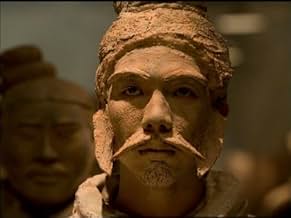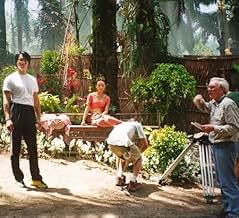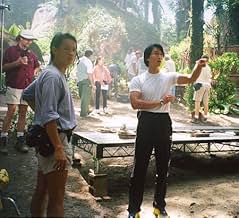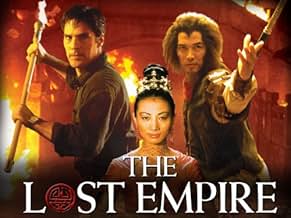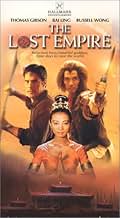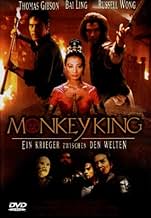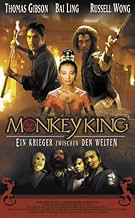CALIFICACIÓN DE IMDb
5.5/10
1.8 k
TU CALIFICACIÓN
Agrega una trama en tu idiomaAmerican journalist seeks lost Chinese manuscript, journeying with magical humanoid ape, pig-man, and ex-cannibal friend. Adventure based on renowned tale.American journalist seeks lost Chinese manuscript, journeying with magical humanoid ape, pig-man, and ex-cannibal friend. Adventure based on renowned tale.American journalist seeks lost Chinese manuscript, journeying with magical humanoid ape, pig-man, and ex-cannibal friend. Adventure based on renowned tale.
- Nominado a 1 premio Primetime Emmy
- 4 nominaciones en total
Explorar episodios
Opiniones destacadas
Lost Empire, a VERY strange title for a retelling of the old Chinese classic adventure "Journey to the West", is a mixed bag of a film. David Hwang's screenplay is in many respects a sequel to the original story, as opposed to being a modern rendition of the original story. I regard this as a mistake as I believe Mr. Hwang lost more by giving up on the original characters than he gained by having a modern setting.
Good points: The lovely Ling Bai did a good job as the Bodhisattva of Compassion (Kwan Yin). Some scenes with Monkey and the "Scholar from Above" went well (mainly the scenes when Monkey rescues his subjects on Flower Fruit Island). Some interplay between "Sandy" and the "Scholar from Above" was funny. Some of the art design for the palace of the Jade Emperor was good (but NOT the throne room, yuk!).
Bad points: Too many explosions. A really ugly and totally wrong portrait of Confucius (I could go on for some time but I'll stick with this key point: Confucius was a materialist. He had no interest in religion and spirits. He was only interested in how a good state was run. The depiction of Confucius in this movie is totally at odds with EVERYTHING that Confucius stood for.) The last half-hour of the movie was anti-climactic, over-wrought, and uninteresting.
Deeper problems: Journey to the West is, at its core, at Buddhist story about the quest to attain enlightenment (along with the fun stuff about beating demons). This story (Lost Empire) takes place AFTER Monkey and Sandy have achieved their ultimate state. They are both "supposed" to be enlightened beings. The problem with this is that a) they don't act like enlightened beings, and b) there isn't much drama possible when you are enlightened. You can really tell the weakness in the writing when Kwan Yin has to tell Monkey's old teacher that "Monkey HAS been blessed by the Buddha". If you need a 3rd party (a goddess no less) to convince other people that you have become enlightened and have been blessed by the Buddha, well, its clear to me that the story is saying one thing, but doing another.
In fact, none of the characters behaves "in character". At least not like the characters that you enjoyed when reading "Journey to the West".
Deepest problem: the story (Lost Empire) is trying to both be and not be "Journey to the West" at the same time. Its trying to both be true to original ideas and be "modern" and up-to-date at the same time. Its trying to be a sequel that retells the original story. It is, in short, a total mess at a very deep level. -- Colin Glassey
Good points: The lovely Ling Bai did a good job as the Bodhisattva of Compassion (Kwan Yin). Some scenes with Monkey and the "Scholar from Above" went well (mainly the scenes when Monkey rescues his subjects on Flower Fruit Island). Some interplay between "Sandy" and the "Scholar from Above" was funny. Some of the art design for the palace of the Jade Emperor was good (but NOT the throne room, yuk!).
Bad points: Too many explosions. A really ugly and totally wrong portrait of Confucius (I could go on for some time but I'll stick with this key point: Confucius was a materialist. He had no interest in religion and spirits. He was only interested in how a good state was run. The depiction of Confucius in this movie is totally at odds with EVERYTHING that Confucius stood for.) The last half-hour of the movie was anti-climactic, over-wrought, and uninteresting.
Deeper problems: Journey to the West is, at its core, at Buddhist story about the quest to attain enlightenment (along with the fun stuff about beating demons). This story (Lost Empire) takes place AFTER Monkey and Sandy have achieved their ultimate state. They are both "supposed" to be enlightened beings. The problem with this is that a) they don't act like enlightened beings, and b) there isn't much drama possible when you are enlightened. You can really tell the weakness in the writing when Kwan Yin has to tell Monkey's old teacher that "Monkey HAS been blessed by the Buddha". If you need a 3rd party (a goddess no less) to convince other people that you have become enlightened and have been blessed by the Buddha, well, its clear to me that the story is saying one thing, but doing another.
In fact, none of the characters behaves "in character". At least not like the characters that you enjoyed when reading "Journey to the West".
Deepest problem: the story (Lost Empire) is trying to both be and not be "Journey to the West" at the same time. Its trying to both be true to original ideas and be "modern" and up-to-date at the same time. Its trying to be a sequel that retells the original story. It is, in short, a total mess at a very deep level. -- Colin Glassey
The Lost Empire is a excellent updating and play off a an ancient Chinese novel entitled "Journey to the West".
For viewers who have some knowledge of Chinese myths and stories this movie is a real treat. It brings back all the wonderful characters of one of the most beloved novels of childhood.
On the other hand if you don't have a clue who the Monkey King was, let alone the celestial Kingdom and the Jade Emperor, than you might not get the underlying story elements, but the movie should still be a great deal of fun simply as a great adventure story with wonderful special effects and some very amusing characters.
This movie can be enjoyed by young and old. Think of it as an Asian version of Wizard of Oz, Ben Hur and Indiana Jones all rolled into one.
For viewers who have some knowledge of Chinese myths and stories this movie is a real treat. It brings back all the wonderful characters of one of the most beloved novels of childhood.
On the other hand if you don't have a clue who the Monkey King was, let alone the celestial Kingdom and the Jade Emperor, than you might not get the underlying story elements, but the movie should still be a great deal of fun simply as a great adventure story with wonderful special effects and some very amusing characters.
This movie can be enjoyed by young and old. Think of it as an Asian version of Wizard of Oz, Ben Hur and Indiana Jones all rolled into one.
Well, this mini-series was the straw that broke the back for producer Robert Halmi with NBC. The faults of his previous rating disaster, "The 10th Kingdom" have not been heeded in this production. The screenplay is overloaded with over the top characters and situations that never let up. But, to me, the failure of "The Lost Empire" falls in three categories. The total miscasting of Thomas Gibson, who gives a tired and stiff performance. Gibson seems to barely be able to walk, much less perform martial arts, and his delivery is unbelievably stilted. The music score is among the worst I've heard in a production like this. There is little thematic melody and even less of the score reflects the rich culture depicted in the story. Third, the director chose to shoot most of the frequent martial arts action from the waist up, so much of the visual impact of those scenes is lost. Indeed, only Bai Ling retains her dignity in the production. The only other redeeming feature is, that the film did cause me to look into the classic book, "Journey to the West."
Some other commentators have bemoaned the historical faults, others the romantic interest. To which I say this - first off, it was a made for TV movie. What is the first role of such a movie? To entertain. Perhaps the History Channel will do a more accurate documentary, if that's what people want. As for the romance, where would the movie "Titanic" have been without the love story? Similarly, this movie needs the romantic interest to move the very 21st Century "Scholar" into a position to want to get involved with people that are more the stuff of Myth, Legend, and to a great degree, Hope. Otherwise, why should he bother? "The Journey West" is a story I'd not heard of. Now, even with this fanciful introduction, I think I'll go look it up and read it. To bring me to do this, both the movie, and other comments here, have thus been successful. Microwave up the popcorn, sit back and enjoy the show. Just don't take it too seriously, just enjoy it for the entertainment that it is.
The Lost Empire, or The Monkey King, as it was called when I saw it on the Hallmark Network, is a silly film, but a very enjoyable one. It attempts to put a new spin on the Chinese classic, Journey to the West, which tells the story of how a monk went on an epic journey to recover some sacred scriptures, aided by the mischievous Monkey King, the gluttonous Pigsy and the sombre Sandy.
In this modern version the companions are the same, but the monk is replaced by a modern American sinologist, and the "scripture" is the original manuscript of Journey to the West itself, which is about to be destroyed by the "five traditional masters", who represent the forces of conservatism. Confused? It gets worse; if the book is destroyed, all the human progress that has taken place since the book was written will be reversed and the world will revert to feudalism. To cap it all, the Jade Emperor, Confucius and Kuan Yin, the goddess of compassion, are all weighing in.
With a scenario like this, the film cannot help but being absurd in places, but the absurdity, intentional or otherwise, is part of the fun, as it was in the original Journey to the West, which is a comedy as well as an analogy of the spiritual journey. Viewers who have read Journey to the West will enjoy the references to it; others can sit back and enjoy the visual richness, which as well as some spectacular scenes and SFX, includes Bai Ling as Kuan Yin, looking far more sexy than a goddess of compassion ought to (but then that's one of the twists in this tale as well).
In this modern version the companions are the same, but the monk is replaced by a modern American sinologist, and the "scripture" is the original manuscript of Journey to the West itself, which is about to be destroyed by the "five traditional masters", who represent the forces of conservatism. Confused? It gets worse; if the book is destroyed, all the human progress that has taken place since the book was written will be reversed and the world will revert to feudalism. To cap it all, the Jade Emperor, Confucius and Kuan Yin, the goddess of compassion, are all weighing in.
With a scenario like this, the film cannot help but being absurd in places, but the absurdity, intentional or otherwise, is part of the fun, as it was in the original Journey to the West, which is a comedy as well as an analogy of the spiritual journey. Viewers who have read Journey to the West will enjoy the references to it; others can sit back and enjoy the visual richness, which as well as some spectacular scenes and SFX, includes Bai Ling as Kuan Yin, looking far more sexy than a goddess of compassion ought to (but then that's one of the twists in this tale as well).
¿Sabías que…?
- TriviaLoosely based on the story from classical Chinese Literature "Journey to the West".
- Citas
Nicholas Orton: So I might never get rich, buy my own jet, or even maintain a stock portfolio. But when I look in her eyes, I know that none of these things really matter.
- ConexionesReferences La mosca (1958)
Selecciones populares
Inicia sesión para calificar y agrega a la lista de videos para obtener recomendaciones personalizadas
- How many seasons does The Monkey King have?Con tecnología de Alexa
Detalles
Contribuir a esta página
Sugiere una edición o agrega el contenido que falta




